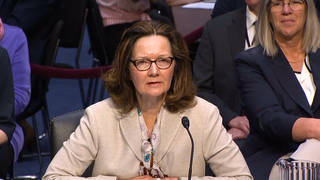
Alleged Al Qaeda leader Khalid Sheikh Mohammed has been moved from Pakistan following his arrest four days ago. He is believed to have been flown to a US detention facility at Bagram air base, in Afghanistan. The New York Times reports that the CIA will likely use sleep deprivation and psychological manipulation to pry information out of him. If these tactics fail, Sen. John Rockefeller of West Virginia suggested the US might turn over Mohammed to a country that does not have restrictions against torture. Such countries include Egypt, Jordan and Morocco.
We are joined by investigative journalist Greg Palast who has written extensively about how the Bush Administration spiked investigations of Osama Bin Laden and his Al Qaeda network.
In a new US edition of his best-selling book ??The Best Democracy Money Can Buy: The Truth about Globalization, Corporate Cons and High Finance Fraudsters Palast writes:
“After Bush took office, he said, 'there was a major policy shift' at the National Security Agency. Investigators were ordered to 'back off' from any inquiries into Saudi Arabian financing of terror networks, especially if they touched on Saudi royals and their retainers. That put the bin Ladens, a family worth a reported $12 billion and a virtual arm of the Saudi royal household, off-limits for investigation. Osama was the exception; he remained a wanted man, but agents could not look too closely at how he filled his piggy bank. The key rule of any investigation, 'follow the money,' was now violated, and investigations — at least before 9/11 — began to die.
“And there was a lot to investigate — or in the case of the CIA and FBI under Bush — a lot to ignore. Through well-known international arms dealers (I’m sorry, but in this business, sinners are better sources than saints) our team was tipped off to a meeting of Saudi billionaires at the Hotel Royale Monceau in Paris in May 1996 with the financial representative of Osama bin Laden’s network. The Saudis, including a key Saudi prince joined by Muslim and non-Muslim gun traffickers, met to determine who would pay how much to Osama. This was not so much an act of support but of protection — a payoff to keep the mad bomber away from Saudi Arabia.”
- Greg Palast, BBC investigative reporter and the author of “The Best Democracy Money Can Buy.”
Related link:












Media Options